 Server
Colocation
Server
Colocation
 CDN
Network
CDN
Network
 Linux Cloud
Hosting
Linux Cloud
Hosting
 VMware Public
Cloud
VMware Public
Cloud
 Multi-Cloud
Hosting
Multi-Cloud
Hosting
 Cloud
Server Hosting
Cloud
Server Hosting
 Kubernetes
Kubernetes
 API Gateway
API Gateway

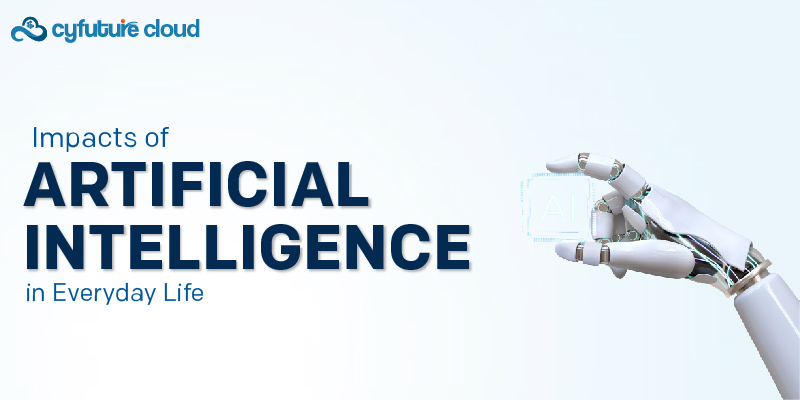
Artificial Intelligence (AI) has quickly changed different parts of daily life, greatly affecting our interactions with technology, decision-making, and daily task management. AI has become a crucial component of our digital world, impacting aspects like shopping and healthcare, from virtual assistants to tailored suggestions.
This article examines how AI affects our everyday lives, specifically its integration with servers, hosting, and cloud technology to provide smooth experiences.
AI is now present in nearly every part of our daily lives, often in ways we may not fully recognize. AI-powered virtual assistants such as Siri, Alexa, and Google Assistant demonstrate how technology through voice commands can assist in:
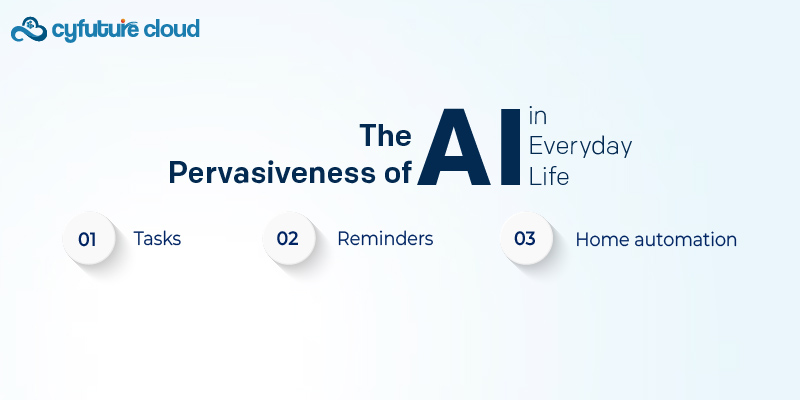
- Tasks
- Reminders
- Home automation
These helpers use sophisticated algorithms to analyze natural language, identify speech patterns, and improve responses based on user interactions for better accuracy and personalization in the long run.
AI has had a notable influence on personalized recommendations in various areas. Algorithms analyze your preferences and behavior to suggest tailored content while browsing on:
E-commerce platforms like Amazon
Watching shows on Netflix
Listening to music on Spotify
This high level of customization improves user experience by simplifying the process of finding new products and content that match your interests.
The healthcare sector has witnessed significant progress thanks to AI. AI-driven technologies transform healthcare delivery, from diagnosing illnesses to forecasting patient results. Using past information, machine learning technology can evaluate medical images, identify irregularities, and recommend treatment strategies. This enhances the precision of diagnoses and cuts down on the time needed to recognize and address medical ailments.
AI also plays a part in healthcare administration tasks. Medical facilities utilize artificial intelligence to:
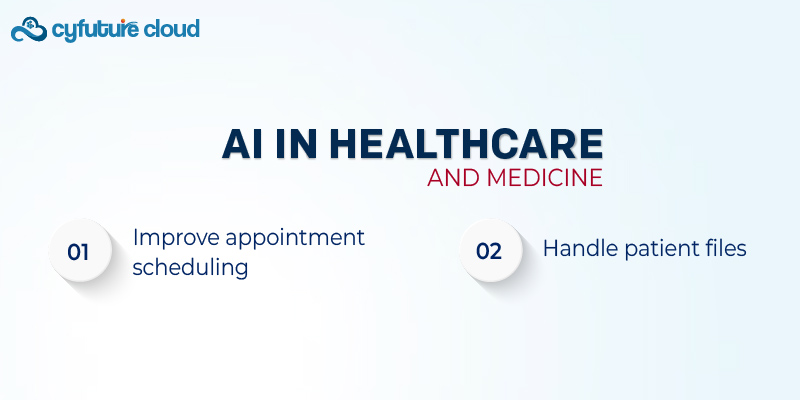
Improve appointment scheduling
Handle patient files
Simplify billing procedures
Automating these regular tasks in healthcare allows providers to dedicate more attention to patient care. This results in enhanced outcomes and increased patient satisfaction.
AI is essential in developing smart cities, making the concept a reality. AI-powered technology is utilized to:
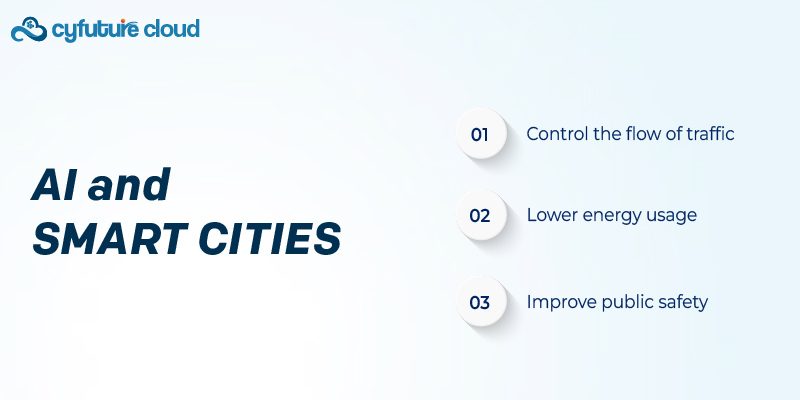
- Control the flow of traffic
- Lower energy usage
- Improve public safety
One example is how AI can assess current traffic flow, adapt traffic signals as needed, and alleviate traffic jams. It can improve energy management by forecasting demand and modifying supply in real time. Thus, it enhances energy utilization and decreases carbon emissions.
AI is also having an impact on public safety. AI-driven surveillance systems can oversee public areas, identify irregular behavior, and notify officials about possible dangers. This improves security and aids in preventing crime and managing disasters.
Businesses use Artificial Intelligence to enhance operations, improve customer experiences, and stimulate growth. AI-driven chatbots in the online retail offer:
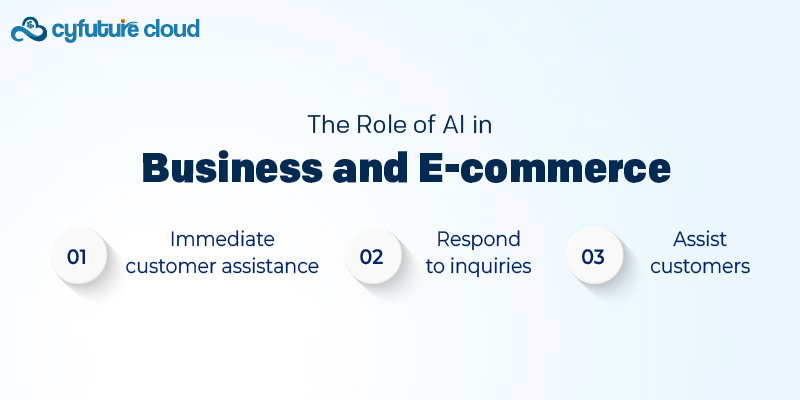
- Immediate customer assistance
- Respond to inquiries
- Assist customers
These chatbots can manage several customer interactions simultaneously. Thus, it delivers fast and effective service that improves customer satisfaction.
AI is utilized in supply chain management to assist in predicting demand, streamlining inventory, and lowering operation expenses. It can use historical data and market trends to predict future demand accurately. Thus, it helps businesses better plan inventory and avoid excess inventory shortages.
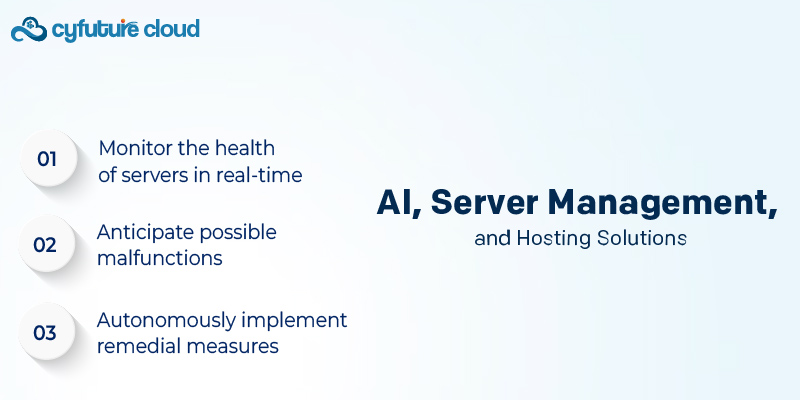
One of the critical areas where AI impacts server management and hosting solutions is server management. As more businesses move to digital platforms, the demand for robust and efficient server infrastructure has increased. AI is pivotal in managing these servers. Thus, it ensures optimal performance and reduces downtime.
AI-powered tools for managing servers can:
- Monitor the health of servers in real-time
- Anticipate possible malfunctions
- Autonomously implement remedial measures
AI is utilized in hosting to improve security, load balancing, and user experience. AI-driven security tools can identify and lessen online risks immediately, safeguarding websites and applications against harmful intrusions. In the same way, AI can enhance load distribution by examining traffic trends and evenly spreading the load among various servers, guaranteeing quick and dependable service for users, even during busy periods.
Cloud technology has transformed how companies store, handle, and retrieve data. Incorporating AI into cloud technology has boosted its capabilities, offering businesses effective tools for data analysis, decision-making, and scaling operations.
AI-powered cloud platforms provide enhanced analytics, allowing businesses to analyze large volumes of data and gain practical insights swiftly. This information can improve marketing tactics, enhance customer interactions, and encourage innovative thinking. AI can examine how customers behave on a website and suggest ways to enhance user experience, like refining the layout, improving navigation, or providing customized content.
Furthermore, AI plays a role in cloud technology by automating data backup, disaster recovery, and software updates. This decreases the burden on IT teams and guarantees the consistent and accurate execution of important tasks.
Artificial Intelligence is now a necessary component of our daily lives. It shapes our interactions with technology, decision-making, and daily task management. It is spurring innovation and increasing effectiveness in different industries, from virtual assistants and tailored suggestions to healthcare and smart cities. The merging of AI with server management, hosting solutions, and cloud technology is enhancing the abilities of digital platforms. Thus, it equipsequips businesses with the necessary tools to succeed in a growing competitive environment. As artificial intelligence advances, its influence on everyday life will increase, becoming a crucial element of our digital future.

Let’s talk about the future, and make it happen!
By continuing to use and navigate this website, you are agreeing to the use of cookies.
Find out more


